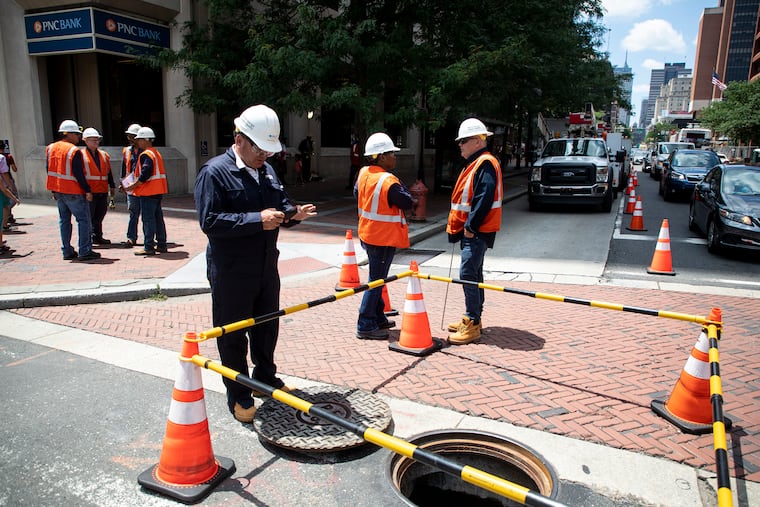Philly needs a publicly owned electric company | Opinion
If the city owned our electrical system, we would have a say in the rates we pay and how the city uses the revenues.

If you believe that climate change is a crisis, then it’s hard to enjoy this pleasantly mild winter. Instead, you worry that it’s a sign of things to come. In the not-too-distant future, Philadelphia is going to suffer from deadly heat, an underwater airport, and all-around more extreme weather — meaning more power outages and wear and tear on our electricity grid. Making matters worse, Pennsylvania is woefully behind on transitioning to renewable energy — less than 5% of our state’s electricity comes from renewable sources.
Philly needs to prepare for the climate crisis. It’s time to kick out our for-profit power system and create a publicly owned utility. If the city owned our electrical system, we would have a say in the rates we pay and how the city uses the revenues. Since our gas utility, Philadelphia Gas Works (PGW), is already publicly owned, an electrical utility might be able to reduce costs through shared administrative costs or other economies of scale.
Public power is hardly a far-out idea. Lots of big cities — including Los Angeles, Seattle, and Jacksonville, Fla. — run their own electrical systems. More than 49 million Americans in around 2,000 communities get their electricity from publicly owned utilities. Public power also has a long history: Franklin Delano Roosevelt believed that cities had an “undeniable basic right” to public power. As governor of New York and as president, he used public power projects like the New York Power Authority and the Tennessee Valley Authority to bring electricity into the homes of millions of working people for the first time.
Investor-owned utilities are trying to turn a profit for their investors — they want to keep their costs low and your bills high. But cutting corners can cost lives. Last year’s devastating wildfires in California, which left more than 100 people dead and thousands of homes destroyed, started with poorly maintained power lines owned by PG&E, one of California’s biggest investor-owned utilities.
Activists across the country — as well as presidential candidate Sen. Bernie Sanders — are calling for more publicly owned utilities. Activists in New York City launched a campaign for public power last summer after utility Consolidated Edison (Con Edison) intentionally cut off power in poor neighborhoods during a deadly heatwave. Lawmakers in Maine may create a statewide public power system because they are tired of a utility one state representative says “cuts corners in customer service” and has a “stranglehold” on state regulators. A coalition of groups called the Alliance for a Just Philadelphia is calling on our city leaders to pursue the same.
Philadelphians might save money with a publicly owned utility, which generally charges lower rates because they don’t have to turn a profit, pay federal taxes, or give big bonuses to CEOs, according to the American Public Power Association. We might also worry less about corruption: Commonwealth Edison (ComEd) — which, like our local utility PECO, is owned by Exelon — is under federal investigation in Illinois for allegedly hiring well-connected politicos for no-show jobs in exchange for higher rates on customers.
When disaster strikes, public power is better prepared. Cities can lend one another a hand to rebuild after extreme weather. The federal government also picks up part of the tab: publicly owned utilities are eligible for disaster relief aid from the Federal Emergency Management Agency. By contrast, investor-owned utilities have to carry commercial insurance that you pay for in your electric bill — insurance that is only getting more expensive as the climate crisis worsens.
Public power is also greener — publicly owned utilities reduced their carbon emissions by an estimated 33% between 2005 and 2017, while investor-owned utilities only cut emissions by 24%. A public power company in Philly could jump-start the wind and solar industry here, create jobs, and lower costs for city residents.
Philly can learn from other cities. Austin, Texas, plans to source 65% of its energy from renewable sources by 2027. Through its GreenChoice energy program, Austin electricity customers can choose to direct their dollars to 100% wind energy. It gives surplus revenue back to customers or puts it into community improvement projects like streetlights, parks, and libraries.
Why should Philly pay more for electricity just to stuff someone’s pocket? We should invest in our own community: It’s time for Philly to embrace public power.
Domenic Powell is a current JD candidate at the University of Pennsylvania Carey Law School, where he is the chair of the Environmental Law Project and a Toll Public Interest fellow.